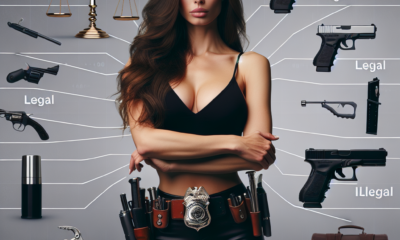Womens Self Defense
Navigating the Legal System: Understanding the Difference Between Legal and Illegal Defense Tactics

Navigating the legal system can be a daunting task for anyone, especially when it comes to understanding the difference between legal and illegal defense tactics. It is essential to have a clear understanding of what is permissible under the law in order to ensure you are properly represented and do not inadvertently engage in misconduct that could harm your case.
Legal defense tactics are strategies employed by attorneys to effectively represent their clients within the confines of the law. These tactics may involve gathering evidence, cross-examining witnesses, presenting legal arguments, and negotiating plea deals with prosecutors. Legal defense tactics are aimed at securing the best outcome for the client while adhering to ethical and legal principles.
On the other hand, illegal defense tactics involve actions that are prohibited by law and can result in severe consequences for both the client and their attorney. Examples of illegal defense tactics include tampering with evidence, suborning perjury, intimidating witnesses, and obstructing justice. Engaging in such tactics can lead to criminal charges, disbarment for attorneys, and negative repercussions for the client’s case.
It is crucial for individuals involved in the legal system to be aware of the line between legal and illegal defense tactics. By working with a reputable and ethical attorney, clients can be confident that their case is being handled in a lawful manner and that their rights are being protected.
To better understand the difference between legal and illegal defense tactics, it is important to communicate openly and honestly with your attorney. Be sure to ask questions about the strategies being employed in your case and raise any concerns you may have about potential ethical violations. Additionally, familiarize yourself with the rules of professional conduct that govern attorneys in your jurisdiction, so you can be aware of any red flags that may indicate illegal behavior.
In conclusion, navigating the legal system requires a keen understanding of the difference between legal and illegal defense tactics. By working with a knowledgeable and ethical attorney, individuals can ensure that their case is being handled in a professional and lawful manner. Remember, it is always better to play by the rules and trust in the integrity of the legal system to secure a fair and just outcome.
Womens Self Defense
Get Empowered: Why Every Woman Should Consider Self-Defense Certification
Absolutely! Let’s dive into the topic. Please provide the article title you’d like me to write about, and I’ll create a detailed piece for you!
Womens Self Defense
Uniting for Justice: Community Organizations Push for Stronger Self-Defense Legislation

Uniting for Justice: Community Organizations Push for Stronger Self-Defense Legislation
In recent years, the dialogue surrounding self-defense laws has grown more complex and critical, highlighting the need for a re-examination of legal frameworks that govern individual conduct during life-threatening encounters. As issues of personal safety, inequality, and the right to self-defense collide, community organizations across the nation are uniting to advocate for stronger self-defense legislation that not only protects individuals but also addresses systemic injustices.
The Current Landscape
Self-defense laws vary widely from state to state, resulting in a patchwork of regulations that can often leave marginalized communities under-protected. Some states have “Stand Your Ground” laws which give individuals the right to use force without the duty to retreat when threatened. Meanwhile, others adhere to more traditional “Duty to Retreat” principles, requiring individuals to avoid confrontation when possible. This inconsistency can lead to unintended consequences, particularly for people of color and those from lower socioeconomic backgrounds, who might be disproportionately criminalized in self-defense situations.
The Call for Reform
In response to these disparities, community organizations are rallying for legislative change. Groups focused on social justice, civil rights, and public safety are coming together to craft proposals aimed at reforming self-defense laws. These advocates argue that it is essential not only to ensure the right to defend oneself but also to create an equitable legal framework that reduces bias in how self-defense cases are prosecuted and adjudicated.
Key Proposals
-
Enhanced Training and Awareness: One significant proposal advocates for mandatory training in self-defense laws for both civilians and law enforcement. Understanding the legal implications of self-defense can empower individuals to make informed decisions during high-pressure situations.
-
Bias Review Measures: Community organizations are pushing for legislative measures that require law enforcement to undergo training on implicit bias and the historical context of self-defense laws. This could mitigate the risk of racial profiling and ensure that self-defense claims are evaluated fairly.
-
Legal Support and Resources: Providing legal resources and support for individuals who defend themselves can help level the playing field. Advocates suggest establishing funds or programs that can assist with legal fees for those who may not otherwise afford representation in self-defense cases.
- Community Dialogues: Engaging community members in discussions about self-defense can foster better understanding and cooperation. Organizing community forums to discuss individual rights, responsibilities, and personal safety can build trust and provide critical information.
Building Coalitions
Collaboration is at the heart of this movement. Organizations with differing focuses—such as gun rights advocates, domestic violence shelters, youth mentorship groups, and racial justice organizations—are finding common ground in the belief that self-defense is a fundamental right that must be accessible to everyone.
These coalitions are also crucial in countering misinformation about self-defense laws and their implications. By working together, they can foster a more informed public debate and promote legislation that is both just and effective.
The Path Forward
As these community organizations continue to push for stronger self-defense legislation, the conversation around justice, equity, and individual safety remains crucial. Advocates emphasize that any reform must be carefully crafted to protect the rights of all individuals while also addressing the underlying societal issues related to violence and safety.
In conclusion, the united effort of community organizations in advocating for stronger self-defense legislation reflects a growing commitment to justice that transcends traditional divides. By prioritizing equity and informed discourse, these groups are not only advocating for change in the law but are also championing the dignity and safety of every individual in society. The path to reform may be arduous, but the collective action of committed organizations can drive meaningful change in ensuring that self-defense rights are upheld for all.
Womens Self Defense
Self Defense Training For Women In A Bar Scene Or Walking The Mall — Lady Of America

http://www.ladyofamerica.com This is the last of the Lady of America Fitness for Women self defense training videos. This video is …
source
-

 Womens Self Defense11 months ago
Womens Self Defense11 months agoNew Legislation Empowers Women to Defend Themselves
-

 Self Defense News1 year ago
Self Defense News1 year agoShe was convicted of killing her abusive boyfriend. Now a Maple Grove woman is home awaiting a new trial.
-

 Self Defense News1 year ago
Self Defense News1 year agoSelf-Defense for All: The new Gracie Jiu-Jitsu Pasadena is for everyone | Online Features
-

 Womens Self Defense1 year ago
Womens Self Defense1 year agoTop 5 Self-Defense Techniques Every Woman Should Know
-

 Womens Self Defense7 months ago
Womens Self Defense7 months agoUnderstanding State-by-State Variation in Self Defense Laws
-

 Womens Fitness1 year ago
Womens Fitness1 year agoXtreme Bodyweight HIIT (Lots of Jumping!) | Joanna Soh (Fio Series)
-

 Womens Preparedness1 year ago
Womens Preparedness1 year ago10 essential skills for surviving in the great outdoors
-

 Womens Preparedness1 year ago
Womens Preparedness1 year agoEmpower Yourself: A Guide to Female Survival Planning



